Here’s a thought exercise. As rock-and-roll fans descend on Graceland for the double celebration of Elvis Week 2018 and the 50th Anniversary of Elvis’ “’68 Comeback” TV special, try to imagine what Memphis might be like today had Singer Presents … Elvis (as the career-defining NBC special was officially named) been a wholesome Christmas variety show instead of the juggernaut rock and gospel performance that it was. Imagine if Presley’s manipulative manager, Colonel Tom Parker, had gotten his way: There would have been no iconic black leather suit. There would have been no gospel medley backed by Darlene Love and the Blossoms. And no reunion of Elvis and his original Sun Studio guitarist, Scotty Moore and drummer DJ Fontana.
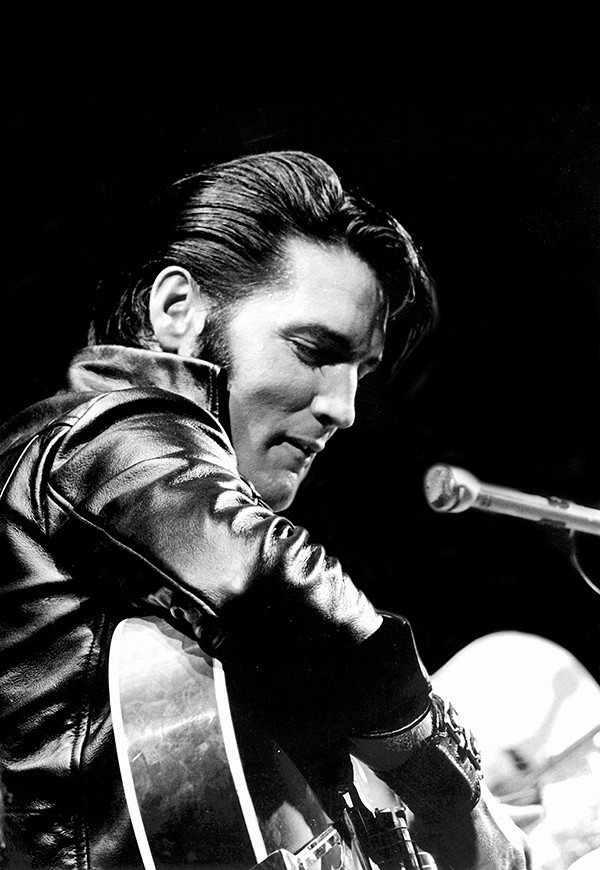 Photo Courtesy Graceland/Elvis Presley Enterprises
Photo Courtesy Graceland/Elvis Presley Enterprises
If the Colonel had gotten the TV special of his dreams, the alleged King of Rock-and-Roll would have crooned his way through seasonal favorites like “I’ll Be Home for Christmas” and an old Frankie Laine song called “I Believe.”
“To this day, I don’t know why he thought ‘I Believe’ was a Christmas song because it’s not,” says the show’s producer/director Steve Binder, in recounting his first awkward encounter with Parker.
Binder had been a logical pick to handle Elvis’ return to TV, having helmed the landmark The T.A.M.I. Show, a 1964 rock and soul concert film with a dozen emerging British and American acts, including The Rolling Stones, James Brown, The Supremes, The Beach Boys, and Marvin Gaye.
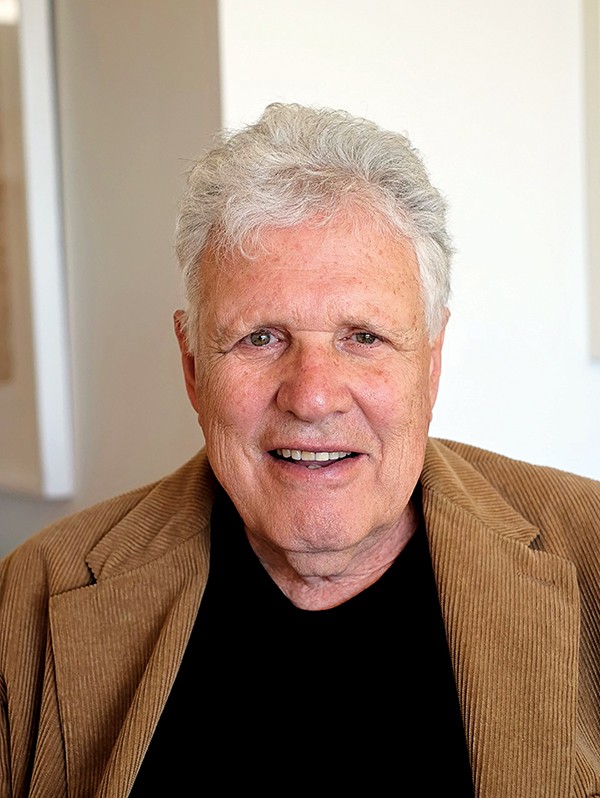 Photo Courtesy Steve Binder
Photo Courtesy Steve Binder
Steve Binder
Still, credentials aside, the young director had to make a good impression on ths Colonel. Otherwise the manipulative Parker wouldn’t permit a private one-on-one meeting with Elvis.
“I truck out to MGM Studios, where Elvis had just finished a movie, and where the Colonel’s offices were,” Binder told the Flyer in a recent telephone interview. “And the Colonel hands me a quarter-inch audio tape of 20 Christmas songs that Elvis had recorded and sent out as a gift to disc jockeys all over America as a present. It’s got a picture of Elvis surrounded by holly and berries. He told me, ‘This is the show that NBC and myself have decided on.'”
Binder had other ideas.
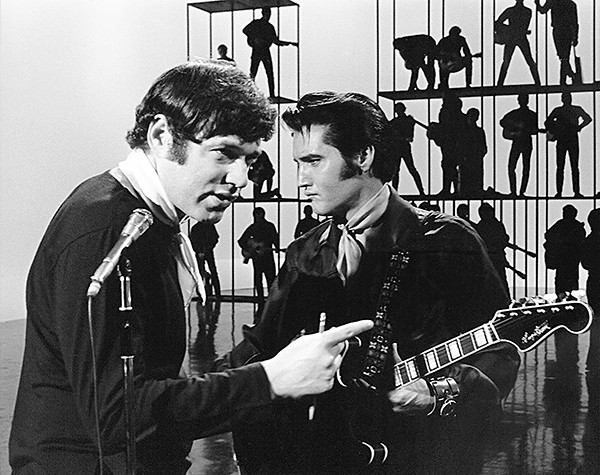 Photo Courtesy Graceland/Elvis Presley Enterprises
Photo Courtesy Graceland/Elvis Presley Enterprises
Steve Binder (left) and Elvis Presley on the set of Singer Presents …
“In my head, instantly, I knew this was a show I’m not going to do,” he says. “So I wrote off the meeting. Drove back to my offices on Sunset.”
By the time Binder arrived back at an office he shared with his partner, music producer Bones Howe, there was a surprise message waiting for him: “Elvis is going to be in your office tomorrow at 4 p.m.”
“If you’re looking for trouble, just look right in my face,” Presley snarls in the tight opening shot of Singer Presents … . And it’s not like the audience watching at home ever had any real choice in the matter, since the singer’s famously sullen mug is framed in an extreme close-up, floating in pitch black background with just a splash of red at his throat.
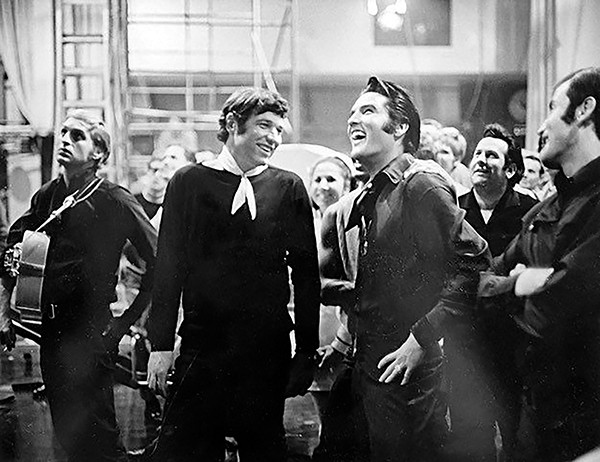 Photo Courtesy Graceland/Elvis Presley Enterprises
Photo Courtesy Graceland/Elvis Presley Enterprises
This is nobody’s Christmas show; it’s Elvis daring fans and critics alike to judge him — to gaze into the bright, blue, bedroom eyes of a massively disruptive artist from the previous decade, and determine whether or not he was still the rebel rocker from Memphis, or if he’d become Hollywood’s toothless Teddy bear, cranking out another round of cheap, non-threatening product.
You’d never know it to look at him, as the camera pulled back and the tune changed from Jerry Leiber & Mike Stoller’s “Evil” to Jerry Reed’s “Guitar Man,” but nobody wanted to know the answer to this question more than Elvis.
“What if it fails?” Elvis asked Binder during the first closed-door meeting with his new director. Money for making Elvis movies was drying up, and the special had only come about in the first place as part of a deal the Colonel had struck with NBC while seeking backers to make more.
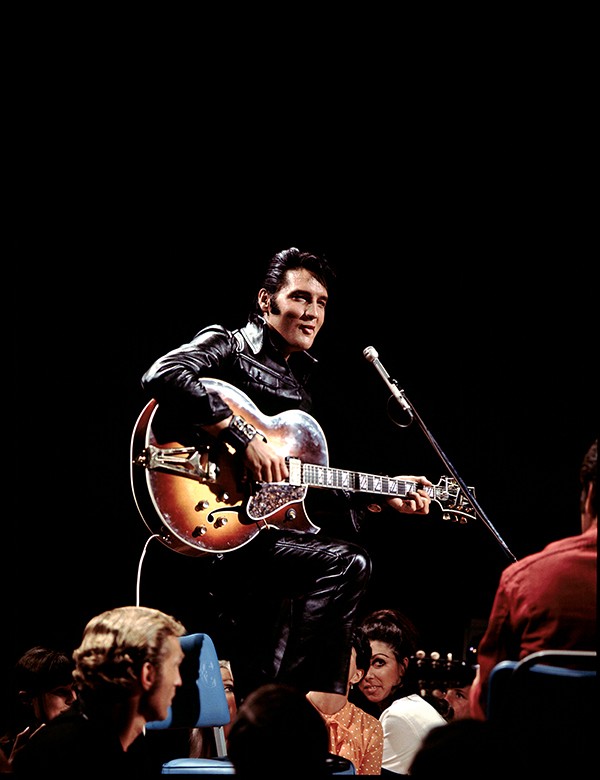 Photo Courtesy Graceland/Elvis Presley Enterprises
Photo Courtesy Graceland/Elvis Presley Enterprises
“If it fails, your career is over,” Binder answered, bluntly. “Nobody will forget the success you had in your early recording career and your movies, but TV is instant. The minute you appear on TV, everybody has an opinion the next morning. If you’re successful, all the doors will open and you’ll have any choice you want. But it’s a gamble, and I can’t promise you it’s going to be successful.”
Presley distrusted TV. The medium had burned him in the past, abetting the moral panic that followed rock-and-roll’s big bang in the 1950s. But he was also frustrated in his role as King of B Musicals. He trusted Binder’s unvarnished answer and felt comfortable in the director’s office. Gold records on the wall, from Howe’s work with groups like The 5th Dimension and The Association, made Elvis feel comfortable enough to drop an unsurprising confession. “The recording studio’s my turf,” he told Binder, allowing that he’d always felt more at home behind a microphone than in front of a movie camera.
“You make a record,” Binder said. “I’ll put pictures to it.”
Elvis had one personal request. He wanted to put “These Boots Are Made for Walking” arranger and session guitarist Billy Strange in charge of the special’s music. Binder agreed instantly.
“This was really the first thing Elvis did outside the womb,” Binder says, explaining why he didn’t hesitate in regard to his star’s one major request. “[Elvis] joined our world instead of me joining his.”
There was one small problem with Elvis’ first choice though. Strange was working on an album with Nancy Sinatra, and the studio was pressuring him to complete it as fast as possible. When, after several prompts, the over-extended Strange still failed to deliver Elvis’ lead sheets in time to start rehearsals, Binder fired him.
“You can’t fire me,” Strange told Binder. “I’ve known Elvis a lot better and for a lot longer than you.”
“Fine,” Binder answered. “Then I’ll be gone and you’ll be there. But one of us is not going to be there.”
Colonel Tom backed the original plan and said Elvis wouldn’t show up for rehearsal if Strange wasn’t there. Nevertheless, Binder moved forward, convincing New York composer/conductor Billy Goldenberg to take over.
“That changed Elvis’ musical life, period,” Binder says. Before that, Elvis had never sung live with an orchestra before. He’d go into the studio to record movie soundtracks with his rhythm section only. Then, additional musicians would be brought in to overdub all the parts.
“He loved every note he heard, and he bonded with all the musicians,” says Binder, who hired Phil Spector’s favorite studio musicians, the Wrecking Crew, and brought in The T.A.M.I. Show and Shindig alums the Blossoms to sing backup.
Blossoms singer and Rock-and-Roll Hall of Fame inductee Darlene Love remembers meeting Elvis in the recording studio. “That’s where we met Elvis and became friends with him,” she told the Flyer. “Especially me because of my gospel background.”
During spare moments, Elvis, who’d already cut a pair of acclaimed gospel albums (How Great Thou Art and His Hand in Mine) grabbed his guitar and asked the Blossoms what their favorite sacred songs were.
“We’d be over in the corner with Elvis just having a good time, and I think sometimes everybody got a little bit angry with us for taking all of his time,” Love says. “He loved what he called ‘the hymns of the church.’ Songs like ‘Precious Lord Take My Hand’ and ‘Amazing Grace’ and ‘How Great Thou Art.’ He would sing the leads and we’d do the background. He would ask us, ‘Is this key all right?’ And you know, whatever key it was in was all right with us.”
Binder was fascinated with the Elvis he saw backstage, singing with the Blossoms or casually jamming in his dressing room with friends.
“I said to myself, instantly, this is better than all the big production numbers we’re doing on stage,” Binder recalls. “We’ve got to get a camera in there.”
But the Colonel, still expecting “I’ll Be Home for Christmas” to show up in the set, inserted himself again. He wouldn’t allow cameras into the dressing room under any circumstances.
“It was insane,” Binder says. “This was the magic! I knew if we were putting out a disc, this is the one that would go platinum. So I just kept pounding the Colonel and hounding him every day. And finally he broke down. I don’t think he was happy that he did it. But he said, ‘Okay, Bindel [sic], if you want to recreate it on stage, you can try that. But I won’t guarantee it’ll get into the show.'”
“I don’t think they realized that part was going to be so big,” Love says of the musical improv reuniting Elvis with Moore and Fontana on numbers like “That’s All Right Mama.”
When Singer Presents … first aired in 1968, it was an hour special cut down to about 48 minutes for commercials. Ratings were gigantic. “It was the first time, in primetime, that one guy did the whole show himself without guest stars,” Binder says.
Though he still had a few feature films left in him, Singer Presents … marked Elvis’ transition away from Hollywood and a return to his roots, touring and recording. He’d take lessons learned from the TV special on the road with him, all the way to Vegas.
When Elvis died in Memphis in 1977, NBC decided to produce a tribute show with Viva Las Vegas co-star Ann-Margret hosting. “They sent a gopher down to the studio catacombs to track down the Elvis Presley special,” Binder says. In a twist of fate, the guy who went down to the basement pulled Binder’s 90-minute director’s cut version off-the-shelf. “That’s when they started airing the 90-minute version,” he says. “A lot depended on luck and fate. I couldn’t be happier.”
Recently, there was a loud buzz about the Elvis era finally drawing to a close. Las Vegas was losing interest. First-generation fans were dying, changing the market, as rare collectables became less rare. The Sun Records television series failed to earn a second season. But 2018 brought a pair of critically acclaimed documentaries — HBO’s exhaustive two-part The Searcher, and Eugene Jarecki’s identity-obsessed The King. And between its fancy new facilities and the most ambitious Elvis Week schedule in the event’s history, Graceland also seems to be ready for another closeup, daring us all to look Presley in the eye one more time.
Binder, Billy Goldenstein, Darlene Love, and other artists connected to the “Comeback Special” are coming to Memphis to participate in Elvis week events at Graceland.
To read the full interviews with Steve Binder, Darlene Love, and Elvis friend and country hitmaker T.G. Sheppard, see Memphisflyer.com.
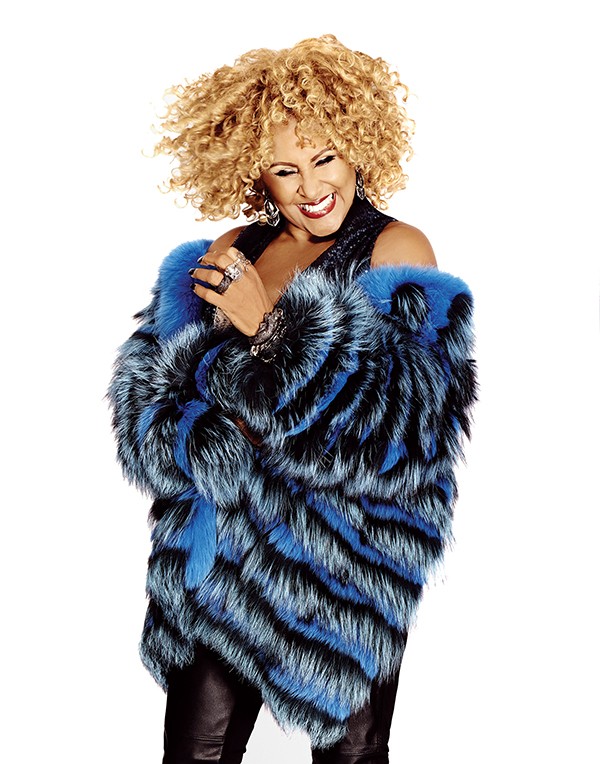
Darlene Love
Love Connection
A Q&A with
Darlene Love of
the Blossoms
Darlene Love may not be a household name, but the Rock-and-Roll Hall of Fame-inducted vocalist can be heard on some of the most iconic recordings of the rock-and-roll era. As a member of the Blossoms, she was a regular on the seminal TV show Shindig and performed in The TA.M.I. Show. She and fellow Blossoms Fanita James and Jean King can be seen performing alongside Elvis during the “’68 Comeback Special” gospel medley. Love will perform an Elvis week concert Monday, August 13th.
Flyer: I know the Blossoms wanted to be recording stars in their own right, but was there some sense of security in working sessions and singing backing vocals?
Darlene Love: That’s very accurate. Because there weren’t really any black groups at the time that were doing this. It was unheard of for them to be doing session work. Most of the sessions were contracted through our union, AFTRA (American Federation of Television and Radio Artists), and most of the people in AFTRA were white singers. They’d call them and put together three or four girls. They didn’t have groups. But we already had a sound. So they could depend on us to have the sound they wanted. Therefore, we became bigger than life doing session work.
Phil Spector hires the Blossoms to sing “He’s a Rebel,” then releases it as a Crystals single.
We didn’t go in there to do it as a group. We went in as a session. And I got paid extra for singing the lead on it. We knew it was going to be a Crystals record. It wasn’t a surprise. The surprise was when we signed with Phil, it was supposed to be my record. But he put that one out under the name of the Crystals too.
But it was a surprise to the Crystals, also, right?
A big surprise. They were out on the road working, and the record was on the charts. They didn’t even know the record was out.
Can you tell me about how Elvis would improvise with singers and musicians between takes or after rehearsals?
It was his down-time. Like going to your room and watching TV. It takes a while to come down after you’ve done a show like that. And [the musicians] would all just sit around and sing gospel songs. Not rhythm and blues or rock-and-roll, but gospel. I’ve been invited to come to the 50th anniversary with my group and my singers. We’re going down to Graceland to celebrate the “’68 Comeback Special.” And most of that show’s going to be gospel.
Elvis Week Calendar:
Thursday, August 9th
Ultimate Elvis Tribute Artist Contest Showcase
1 p.m. Guest House Theater, Guest House at Graceland. $20
Friday, August 10th
Tupelo, Mississippi – Birthplace of Elvis Presley Graceland Excursion
Departs The Guest House at Graceland at 8:30 a.m. and returns by 3:30 p.m.
$99/adults; $79/children ages 5-12; children under 5 are not permitted.
Ultimate Elvis Tribute Artist Contest Meet ‘n’ Greet
11 a.m.–1 p.m, Guest House at Graceland Ballroom.
Ultimate Elvis Tribute Artist Contest Semifinal Round
7 p.m. Graceland Soundstage, Elvis Presley’s Memphis. $219, $139, $35
Saturday, August 11th
Mississippi Delta Blues Tour
Departs the Guest House at Graceland at 8:30 a.m. and returns by 6:30 p.m. $119/adults; $89/children ages 5-12; children under 5 are not permitted.
36th Annual Elvis 5K Run Benefiting Livitup
8 a.m. Run starts and finishes at gates of Graceland.
Listening Party for Where No One Stands Alone Album Release featuring Lisa Marie Presley
1 p.m. Graceland Soundstage, Elvis Presley’s Memphis. $30
ELVIS: The Greatest Hits Ultimate Tribute Artist Show
7 p.m. Graceland Soundstage, Elvis Presley’s Memphis. $219, $139, $59
Sunday, August 12th
Elvis Presley Fan Club Presidents’ Event
10 a.m. Graceland Soundstage, Elvis Presley’s Memphis. $25
The Auction at Graceland
12:30 p.m. Guest House Theater, The Guest House at Graceland. Free to attend; must register to bid.
Ultimate Elvis Tribute Artist Contest Final Round
7 p.m. Graceland Soundstage, Elvis Presley’s Memphis. $219, $139, $59
Monday, August 13th
Fan Reception
10 a.m. – noon. Elvis Presley Memorial Trauma Center at Regional One Health, 877 Jefferson Ave., Memphis. Free.
Elvis Fan Reunion
1 p.m. Grand Ballroom, The Guest House at Graceland. $10
Darlene Love in Concert
7 p.m. Graceland Soundstage, Elvis Presley’s Memphis. $55
Elvis Week Dance Party
9 p.m. – 12:00 a.m. Grand Ballroom, The Guest House at Graceland. $25
Tuesday, August 14th
Conversations on Elvis: Co-stars
10 a.m. Graceland Soundstage, Elvis Presley’s Memphis. $25
Inside the Archives
3 p.m. Guest House Theater, The Guest House at Graceland. Free.
The Founders Reception
5 – 6 p.m. Founders Room, the Guest House at Graceland. Event reserved for Founders only.
The Gospel Music of Elvis Presley Celebration Concert
7 p.m. Graceland Soundstage, Elvis Presley’s Memphis. $55
Wednesday, August 15th
Conversations on Elvis: Gospel
10 a.m. Graceland Soundstage, Elvis Presley’s Memphis. $30
A Musical Salute to Elvis
4:30 p.m. Graceland Soundstage, Elvis Presley’s Memphis. $25
Candlelight Vigil
8:30 p.m. Graceland Front Gate.
Thursday, August 16th
Conversations on Elvis: ’68 Special
10 a.m. Graceland Soundstage, Elvis Presley’s Memphis. $25 Featuring “’68 Comeback” producer/director Steve Binder, music director Billy Goldenberg; writer Allan Blye; guitarist Mike Deasy; and Tanya Lemani George, the belly dancer who performed during “Little Egypt.”
Annual Elvis Memorial Service
Noon. University of Memphis Main stage in the Theatre Building. Free. Limited seating availability.
NIKO Live in Concert
3 p.m. The Guest House at Graceland Theater, Guest House at Graceland. $15.
ELITE Package Holder Evening Reception
5 p.m. Grand Ballroom, Guest House at Graceland.
Reserved for ELITE package holders only.
’68 Special 50th Anniversary Celebration
7 p.m. Graceland Soundstage, Elvis Presley’s Memphis. $55
Friday, August 17th
Conversations on Elvis: Elvis Connections
10 a.m. Graceland Soundstage, Elvis Presley’s Memphis. $25. Special guests include: Ann Moses, editor at Tiger Beat Magazine from 1965-1972; gospel singer Billy Blackwood, “In the Ghetto” harmony singer Donna Rhodes Morris; and country star TG Sheppard.
Party at Elvis Presley’s Memphis
7:30 p.m. – 9:30 PM. Elvis Presley’s Memphis. $45
Saturday, August 18th
Elvis Week Brunch
9:30 a.m. Grand Ballroom, The Guest House at Graceland. $45
TG Sheppard and Kelly Lang in Concert
3 p.m. Guest House Theater, Guest House at Graceland. $25.
Elvis Live in Concert – with an All-Star Band
7 p.m. Graceland Soundstage, Elvis Presley’s Memphis. $55
